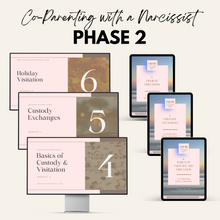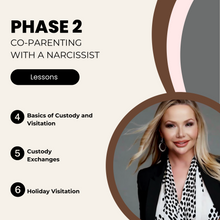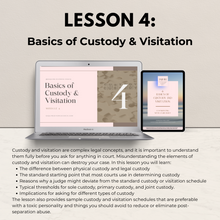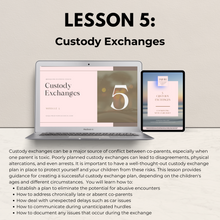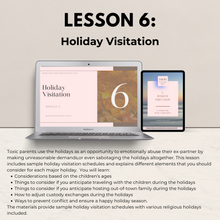
Lesson 4: Basics of Custody and Visitation
Misunderstanding the elements of custody and visitation can destroy your case.
Custody and visitation are complex legal concepts, and it is important to understand them fully before you ask for anything in court. If you ask for the wrong things, you could unknowingly sabotage your case.
This lesson will help you to understand the basic elements of custody and visitation. You will learn about:
- The difference between physical custody and legal custody
- The standard starting point that most courts use in determining custody
- Reasons why a judge might deviate from the standard custody or visitation schedule
- Typical thresholds for sole custody, primary custody, and joint custody.
- Implications for asking for different types of custody
The lesson also provides sample custody and visitation schedules that are preferable with a toxic personality and things you should avoid to reduce or eliminate post-separation abuse.
By understanding the elements of custody and visitation, you can ask for the right things in court and protect yourself and your child from harm.
Lesson 5: Custody Exchanges
Custody exchanges can be a major source of conflict between co-parents, especially when one parent is toxic. Poorly planned custody exchanges can lead to disagreements, physical altercations, and even arrests. It is important to have a well-thought-out custody exchange plan in place to protect yourself and your children from these risks. This lesson discusses the importance of custody exchange plans and the pitfalls of bad plans. It also provides tips for creating a successful custody exchange plan, depending on the children's ages and different circumstances.
You will learn how to:
- Establish a plan to eliminate the potential for abusive encounters
- How to address chronically late or absent co-parents
- How deal with unexpected delays such as car issues
- How to communicate during unanticipated hurdles
- How to document any issues that occur during the exchange
By following these tips, you can create a custody exchange plan that will protect yourself and your children from conflict and danger.
Lesson 6: Holiday Visitation
Toxic parents may use the holidays as an opportunity to emotionally abuse their ex-partner or their children. They may try to control the visitation schedule, make unreasonable demands, or even sabotage the holidays altogether. This lesson provides information on how to protect yourself and your children from holiday abuse by a toxic parent. It includes sample holiday visitation schedules and explains different elements that you should consider for each major holiday.
You will learn:
- Considerations based on the children’s ages
- Things to consider if you anticipate traveling with the children during the holidays
- Things to consider if you anticipate hosting out-of-town family during the holidays
- How to adjust custody exchanges during the holidays
- Ways to prevent conflict and ensure that you and your children have a happy holiday season.
The materials provide sample holiday visitation schedules with various religious holidays included.





